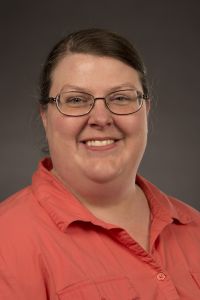
Amanda Christensen
Administrative Assistant I
Office: LA 262
EDUCATION
DMA (Doctor of Musical Arts), University of Oregon
MM (Master of Music), Portland State University
BM (Bachelor of Music), Idaho State University
After completing my doctorate in Oregon (I have a DMA in Voice Performance and Arts Administration), I decided to move back to my hometown to be closer to my family. I had not found a teaching position so was looking for work. This position at ISU was right up my alley. I enjoy working in academia and helping other students find a love of learning. In my spare time, I enjoy singing and playing the piano, teaching private music lessons, and reading.
.jpg)
Kirsten Cooper
Office Specialist II
Office: LA 241
EDUCATION
BA, English - Professional Writing (2017), Idaho State University
I am an ISU graduate and happy to be working at my alma mater. Prior to joining English and Philosophy, I worked in a number of departments on campus, including Marketing and Communications, Human Resources, and the ISU Foundation. I was drawn to this position for the opportunity to engage more closely with students and to rejoin the department I earned my degree from. In my free time, I enjoy watching movies, playing games, traveling, and spending time with my husband and pets.

Brent Wolter
Professor of English; Chair of the Department of English and Philosophy
Office: LA 263
EDUCATION
PhD, Applied Language Studies (2005), University of Wales at Swansea
MA, TESL/TEFL (1999), University of Birmingham
BA, English & Psychology (1991), Wartburg College, Waverly, Iowa
I am an applied linguist with an interest in second language acquisition, particularly vocabulary acquisition. I joined the faculty here at Idaho State University in 2005, where one of my main responsibilities is to collaborate on the establishment and implementation of the English department’s Graduate Certificate in TESL. The program is designed to serve both teachers in local communities, as well as teachers of English in foreign language environments.
Before coming to ISU, I taught English in Japan for more than a decade. Through this experience, I became interested in the field of applied linguistics partly due to my desire to improve myself as a teacher, and partly due to my curiosity about the social, psychological, and cognitive processes that lead to the successful acquisition of second languages. My research in the field especially reflects my concern with understanding how vocabulary acquisition and vocabulary use function at a psycholinguistic level.
I enjoy teaching both at the graduate and undergraduate levels. As a teacher, I particularly look forward to that moment where students realize that linguistics is actually a lively, engaging, and relevant area of study, even though it often has the false image of being the tedious process of cataloging the intricacies of language.
Selected Publications
Wolter, B. (2024). Approaches to vocabulary instruction from an input processing perspective. In J. Barcroft & W. Wong (Eds.), Handbook of SLA and Input Processing. Routledge.
Wang, H., Guo, H., Yang, L., & Wolter, B. (2023). A decade of research into second language acquisition: A state-of-the-science review (2009-2019). Chinese Journal of Applied Linguistics, 46(3), 386-403.
Wolter, B. (2023). Cross-language influences in the acquisition of L2 multiword expressions. In I. Elgort, A. Siyanova-Chanturia, & M. Brysbaert (Eds.), Cross-language Influences in Bilingual Processing and Second Language Acquisition (pp. 211–228). John Benjamins Publishing Company. https://benjamins.com/catalog/bpa.16
Pei, X., Yang, L., Chen, Y., & Wolter, B. (2022). Chinese EFL learners’ apology strategies: A multimodal perspective: Applied Pragmatics, 5(1), 64–85. https://doi.org/10.1075/ap.20021.pei
Wolter, B. (2022). Refining optimum levels of acquisition and L1 semantic influences in the Ontogenesis Model. Bilingualism: Language and Cognition, 25(2), 234–235. https://doi.org/10.1017/S1366728921000584 (invited by editor)
Wolter, B., Leung, C. Y., Wang, S., Chen, S., & Yamashita, J. (2022). Comparing linguistic and cultural explanations for visual search strategies. Cognitive Linguistics, 33(4), 623–657. https://doi.org/10.1515/cog-2020-0105 (peer reviewed)
Wolter, B., Yamashita, J., & Leung, C. Y. (2020). Conceptual transfer and lexical development in adjectives of space: Evidence from judgments, reaction times, and eye tracking. Applied Psycholinguistics, 41(3), 595-625.
Cui, Y., Yang, L., & Wolter, B. (2019). Alignment effect in the continuation task of Chinese low-intermediate English learners. Applied Linguistics Review. https://doi.org/10.1515/applirev-2019-0035
Wolter, B. (2019). Key issues in teaching multiword items. S. Webb (Ed.), Routledge handbook of vocabulary studies (pp. 493-510). New York: Routledge Publishers.
Wolter, B. & Yamashita, J. (2017). Word frequency, collocational frequency, L1 congruency, and proficiency in L2 collocational processing: What accounts for L2 performance? Studies in Second Language Acquisition.
Gyllstad, H. & Wolter B. (2016). Collocational processing in the light of a phraseological continuum model: Does semantic transparency matter? Language Learning, 66, 296-323.
Wolter, B. & Helms-Park, R. (2016). Lexical knowledge and processing in second language reading. In X. Chen Bumgardner, V. Dronjic,, & R. Helms-Park (Eds.). Second language reading: Psycholinguistic and cognitive perspectives (pp. 133-158). New York: Routledge Publishers.
Wolter, B. & Yamashita, J. (2015). Processing collocations in a second language: a case of first language activation? Applied Psycholinguistics, 36, 1193-1221.
Wolter, B. & Gyllstad, H. (2013). Frequency of input and L2 collocational processing: a comparison of congruent and incongruent collocations. Studies in Second Language Acquisition, 35, 451-482.
Zareva, A. & Wolter, B. (2012). The 'promise' of three methods of words association analysis to L2 lexical research. Second Language Research, 28, 41-67.
Wolter, B. & Gyllstad, H. (2011). Collocational links in the L2 mental lexicon and the influence of L1 intravesical knowledge. Applied Linguistics, 32, 430-449.
Wolter, B. (2009). Meaning-last vocabulary acquisition and collocational productivity. In T.Fitzpatrick & A. Barfield (Eds.), Lexical Processing in Second Language Learners (pp. 128-140). Clevedon: Multilingual Matters.
Wolter B. (2006). Lexical network structures and L2 vocabulary acquisition: the role of L1 lexical/conceptual knowledge. Applied Linguistics, 27, 741-747.
Wilks, C., Meara, P., & Wolter, B. (2005). A further note on simulating word association behavior in a second language. Second Language Research 21(4), 359-372.
--Reprinted in Connected Words by Paul Meara. Baltimore: John Benjamins (2009).
Meara, P. & Wolter, B. (2004). V_Links: beyond vocabulary depth. Angles on the English-speaking World, 4, 85-96.
--Reprinted in Connected Words by Paul Meara. Baltimore: John Benjamins (2009).
Wolter, B. (2002). Assessing proficiency through word associations: Is there still hope? System, 30, 315-329.
Wolter, B. (2001). Comparing the L1 and L2 mental lexicon: a depth of individual word knowledge model. Studies in Second Language Acquisition, 23, 41-69.
Wolter, B. (2000). A participant-centered approach to INSET course design. ELT Journal, 54, 311-318.
Awards/Honors
Master Teacher, ISU, 2010
Courses Taught
6682: Methods of Teaching English as a Second Language
6681: Theory of Second Language Acquisition
4485/5585: Linguistic Analysis
4484/5584: Rotating Topics in Linguistics
2281: Introduction to Language Studies
1102: Writing and Rhetoric II
1101: Writing and Rhetoric I

James Skidmore
Associate Professor of Philosophy; Department Vice Chair; Director of Philosophy
Office: LA 253
Education
PhD, Philosophy (2000), University of Minnesota
BA, Philosophy (1993), Washington State University
BA, English (1992), Washington State University
My main philosophical interests are in ethical theory, and in particular Kantian and utilitarian moral theory. In my dissertation I focused on Kantian theories and their inability to accommodate moral obligations toward non-human animals. I argued, and continue to argue, that their failure in this regard constitutes a serious theoretical problem. My interests are now gradually turning toward the project of developing and defending a plausible consequentialist theory (an approach that traditionally defines morally right action as action that maximizes overall, long-run value; utilitarianism is an example of such an approach). Since a crucial first step is to define consequentialism in a plausible way, my current work examines how, and how not, to do this. From here my goal is to contribute to the defense of such a theory. Since I believe there is little hope of doing so through conceptual analysis or argument a priori, my concern is to examine the extent to which a consequentialist theory can accommodate various considered judgments that are widely shared at the level of practice—in particular, features of our moral practice that appear to be thoroughly non-consequentialist in nature.
While these topics are the focus of my research, my teaching continues to be in many ways the most rewarding part of my job. I regularly teach lower-division courses in Introduction to Ethics, Introduction to Philosophy, and Bioethics. I also teach upper-division courses in Ethical Theory, Political Philosophy, and Philosophy of Law. When schedules permit, I enjoy teaching courses on special topics—recent examples include Philosophy of War and Terrorism and an Honors Seminar: Lying and Deception.
Selected Publications
"Does ‘Ought’ Imply ‘Might’? How (not) to Resolve the Conflict between Act and Motive Utilitarianism." Philosophia 46 (2018), 207-221.
“Skepticism about Practical Reason: Transcendental Arguments and Their Limits.” Philosophical Studies 109 (2002), 121-141.
“Duties to Animals: The Failure of Kant’s Moral Theory.” Journal of Value Inquiry 35 (2001), 541-559.
--Reprinted in Applied Ethics, Dimock and Tucker (eds.),Thomson Nelson (2004), 160-176.
--Reprinted in Environmental Ethics, Botzler and Armstrong (eds.), McGraw-Hill (2003).
Awards/Honors
Master Teacher, ISU, 2011
Courses Taught
4450/5550: Ethical Theory
3353: Philosophy of Law
2230: Medical Ethics
1103: Introduction to Ethics
1101: Introduction to Philosophy
POLS 3313: Political Philosophy

Thomas Klein
Professor of English; Director of Graduate Studies in English
Office: LA 242
EDUCATION
PhD, Medieval Studies (1998), University of Toronto
MA, Medieval Studies (1992), University of Toronto
BA, Medieval Studies and the Epic (1990), Kenyon College
Diploma, Italian Language and Culture (1989), Università per Stranieri, Perugia, Italy
As a philologist, I'm interested in early medieval writing, and how knowledge is represented in physical form. Recently, I have written a series of articles on Anglo-Saxon riddles and inscribed objects, including the Franks Casket, the Staffordshire Hoard, and the Vindolanda tablets.
I enjoy teaching all my classes, from Composition to Old English. I find that there is always occasion for shared inquiry and discovery in the classroom, and I feel fortunate to be able to work with students and colleagues at ISU, as well as the larger community in Pocatello.
Selected Publications
"Scribal interpretation of problematic passages in Old English poetry: Insights from theories of textual difficulty," Studia Neophilologica (June 2024).
“Old English Wlitan and Wlatian: Poetic Verbs of Looking (and Seeing),” ANQ: A Quarterly Journal of Short Articles, Notes and Reviews, (September 2023).
“'Savage' and 'Medieval' in C. S. Lewis’s The Discarded Image," Neophilologus: Journal of Modern and Medieval Language and Literature (March 2023).
"Does preverbal Old English ge- have semantic or aspectual force?: evidence from the Dictionary of Old English." Studia Neophilologica (January 2022).
“Pater Occultus: The Latin Bern Riddles and their Place in Early Medieval Riddling,” Neophilologus: Journal of Modern and Medieval Language and Literature (July 2019).
“Old and New Technologies of Asynchronous Communication: Virtual Narratives and ‘Presence’”. In Narrative, Identity, and Academic Community in Higher Education, ed. Attebery, Gribas, McBeth, Sivitz, and Turley-Ames (Routledge, 2017).
"The Metaphorical Cloak of Exeter Book Riddle 83, 'Ore / Gold / Metal'," ANQ: A Quarterly Journal of Short Articles, Notes, and Reviews (June 2015).
"Of Water and the Spirit: Metaphorical Focus in Exeter Riddle 74." Review of English Studies (February 2015)
"The Non-Coherence of the Franks Casket: Reading Text, Image, and Design on an Early Anglo-Saxon Artifact." Viator (Summer 2014).
"The Inscribed Gold Strip in the Staffordshire Hoard: The Text and Script of an early Anglo-Saxon Biblical Inscription." Anglo-Saxon Studies in Archaeology and History (2013).
"Dialect and Word Choice in Old English: Two Case Studies with Old English Perception Verbs." Anglia: Journal of English Philology (2012).
"Anglo-Saxon Literacy and the Roman Letters on the Franks Casket." Studia Neophilologica (May 2009).
"The Ghostly Voice of Gossip in Faulkner's 'A Rose for Emily.'" The Explicator (Summer 2007).
"Stanc æfter stane (Beowulf, l. 2288): Philology, Narrative Context, and the Waking Dragon." Journal of English and Germanic Philology (January 2007).
"Six Colour Words in the Pearl Poet: Middle English Blake, Blayke, Blaht, Blo, Blwe and Ble." Studia Neophilologica (Spring 2000).
"The Old English Translation of Aldhelm’s Riddle Lorica." Review of English Studies (1997).
"In Praise of Bald Men: A Translation of Hucbald’s Ecloga de calvis." Comitatus (1996).
"Words for the Colour Orange in Italian." Quaderni d’italianistica (1994).
Awards/Honors
Outstanding Faculty Advisor, Idaho State University, 2022
Master Teacher, Idaho State University, 2017
Courses Taught
6662: Seminar in Medieval Literature: Medieval Women Mystics
6625: Cross-Cultural Encounters in the Middle Ages
4491: Senior Seminar in Literature
4490/5590: Topics in Folklore: Riddles and Charms
4487/5587: History of the English Language
4486/5586: Old English
4473/5573: Chaucer
4462/5562: Medieval Literature: Dream Visions of the Later Middle Ages
4462/5562: Medieval Literature: Epic and Romance
4461/5561: Classical Literature: Myth and Epic
3323: Genre Studies in Prose Fiction: The Short Story Sequence
2281: Introduction to Language Studies
2280: Grammar and Usage
2267: Survey of British Literature I
2211: Introduction to Literary Analysis
1175: Literature and Ideas
1115: Themes in Literature: Love and Death
1102: Writing and Rhetoric II
1101: Writing and Rhetoric I
HONS 1101: Honors Humanities I

Margaret Johnson
Professor of English; Director of Composition
Office: LA 235
EDUCATION
PhD, English (1998), University of Oregon
MA, English (1990), San Jose State University
BS, Business Administration - Accounting (1986), University of California, Berkeley
I work in the fields of rhetoric and composition, postmodern fiction, and film studies. In the area of rhetoric and composition, my work focuses on pedagogical issues; in postmodern fiction, I deal mostly with issues of style and form. My research in film deals primarily with genre studies and queer theory. I regularly teach courses in all three areas.
Selected Publications
My work has appeared in the following publications: Quarterly Review of Film and Video, Film-Philosophy Quarterly, Popular Culture in Libraries, Genre, The Encyclopedia of Novels into Film, and CEA Forum. I have an article in the book The Geographical Imagination of Annie Proulx: Rethinking Regionalism (edited by Alex Hunt), and I wrote the Instructor’s Manual for The Shape of Reason, 3rd edition. My book Literary Studies: A Practical Guide was co-authored with Tison Pugh.
Courses Taught
6642: Seminar in Oral/Popular Culture: Film Adaptation
6632: Seminar in Teaching Literature
6631: Seminar in Teaching Writing
6627: Seminar in Major Literary Figures: John Barth and Don DeLillo
6625: Seminar in a Literary Period: The Problem(s) of the Postmodern
6610: Careers in English
4493: Senior Seminar in Professional Writing
4492: Senior Seminar in Literature: The Problem of Fiction
4469/5569: Contemporary Literature: Postmodernism
4431/5531: Teaching and Writing Projects
4401/5501: Advanced Composition
3323: Genre Studies in Drama
3308: Business Communications
3305: Art of Film II: Romantic Comedy
2278: Survey of American Literature II
2268: Survey of World Literature II
2267: Survey of World Literature I
1126: Art of Film I

